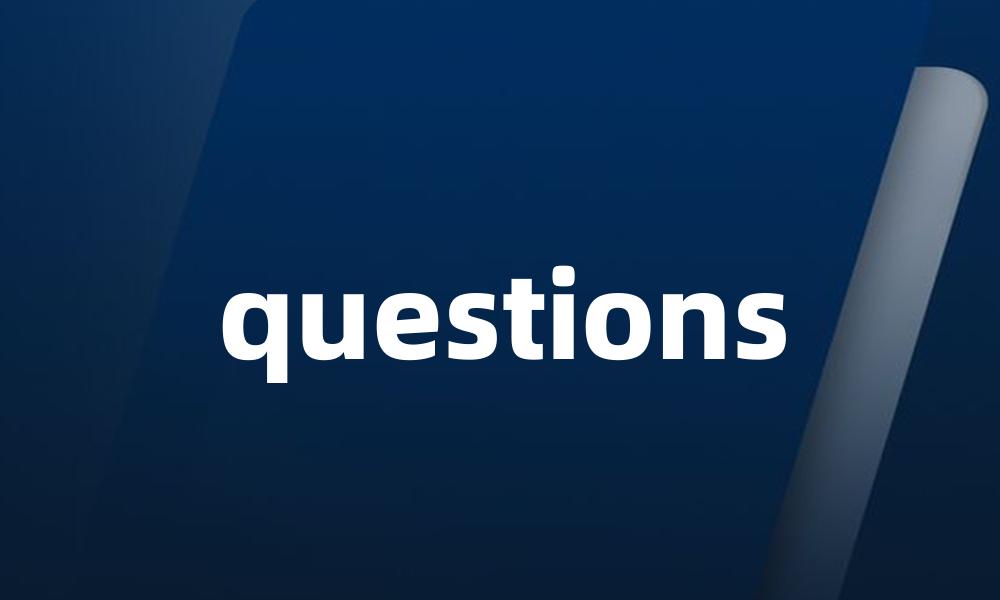
questions
形容词 (Adjective)
1. 有问题的,有疑问的。
2. 值得质疑的,有争议的。
3. 追问的,追究的。
名词 (Noun)
1. 问题,疑问。
2. 考试题目,测验题。
3. 问题(指被提问者不懂的事情)。
4. 问题(指需要解决的事情)。
5. 问题(指讨论或研究的课题)。
6. 疑点,疑难问题。
7. 疑问句。
词语辨析
1. question与ask的区别:question强调要求回答,而ask强调提出问题。
2. question与inquiry的区别:question指正式或明确的问题,而inquiry指的是调查或探究的行为。
词汇扩充
1. questioning (n. 质问,讯问)
2. questioner (n. 提问者,询问者)
3. questionable (adj. 值得怀疑的,不可靠的)
4. unquestioning (adj. 不加怀疑的,盲从的)
近义词
1. query (n. 问题,疑问)
2. inquiry (n. 调查,询问)
3. doubt (n. 怀疑)
4. problem (n. 问题,难题)
反义词
1. answer (n. 回答)
2. solution (n. 解答,解决办法)
柯林斯词典
[名词]
1. [countable] A question is something that you say or write in order to ask a person about something.
2. [countable] A question is a problem or puzzle that you have to solve by thinking or by using mathematics.
3. [uncountable] You can refer to a problem, matter, or subject as a question when you are worried or talking about it.
4. [uncountable] The question of whether something is true or whether you should do something is whether it is true or whether you should do it.
[动词]
1. If you question someone, you ask them questions about something.
2. If you question whether something is true or whether you should do something, you have to think carefully about whether it is true or whether you should do it.
牛津词典
[名词]
1. A sentence worded or expressed so as to elicit information.
2. A doubt about the truth or validity of something.
3. A matter requiring resolution or discussion.
[动词]
1. Ask questions of (someone), especially in an official context.
2. Feel or express doubt about; raise objections to.
用法
1. "Ask questions"表示主动提问,"answer questions"表示回答问题。
2. "Pop question"指突然提问,"rhetorical question"指修辞性问题。
3. "Question about"指对...提出质疑,"question of"指关于...的问题。
4. "Call into question"表示对...产生怀疑,"beyond question"表示毫无疑问。
例句
- He asked me a question that I couldn't answer. 他问了一个我无法回答的问题。
- The teacher gave us a math question to solve. 老师给了我们一个需要解决的数学问题。
- The question of climate change is of great concern. 气候变化的问题引起了极大的关注。
- I have a question about the assignment. 我对作业有一个问题。
- We need to address the question of poverty in our society. 我们需要解决社会上的贫困问题。
- The detective faced many difficult questions during the interrogation. 在审讯中,侦探面临着许多棘手的问题。
- He questioned her about her whereabouts on the night of the crime. 他询问她犯罪当晚的行踪。
- I question whether he is telling the truth. 我对他是否在说真话表示怀疑。
- The authenticity of the painting has been called into question. 这幅画的真实性受到了质疑。
- Their decision is beyond question. 他们的决定毫无疑问。
- He asked a rhetorical question to emphasize his point. 他提出一个修辞性问题以强调他的观点。
- The defense attorney began to question the witness. 辩护律师开始对证人进行质问。
- There is no question that she is talented. 毫无疑问,她很有才华。
- We have some questions regarding the new policy. 我们对新政策有一些疑问。
- Her honesty is beyond question. 她的诚实毋庸置疑。
- He called into question the validity of the research findings. 他对研究结果的有效性提出了质疑。
- She always challenges the status quo and questions authority. 她总是质疑现状并对权威提出质疑。
- The question of whether to proceed with the project remains unanswered. 是否继续进行该项目的问题仍然没有答案。
- He asked a series of probing questions during the interview. 在面试中,他提了一连串深入的问题。
- He never hesitates to question conventional wisdom. 他从不犹豫地质疑传统智慧。

 小皮
小皮